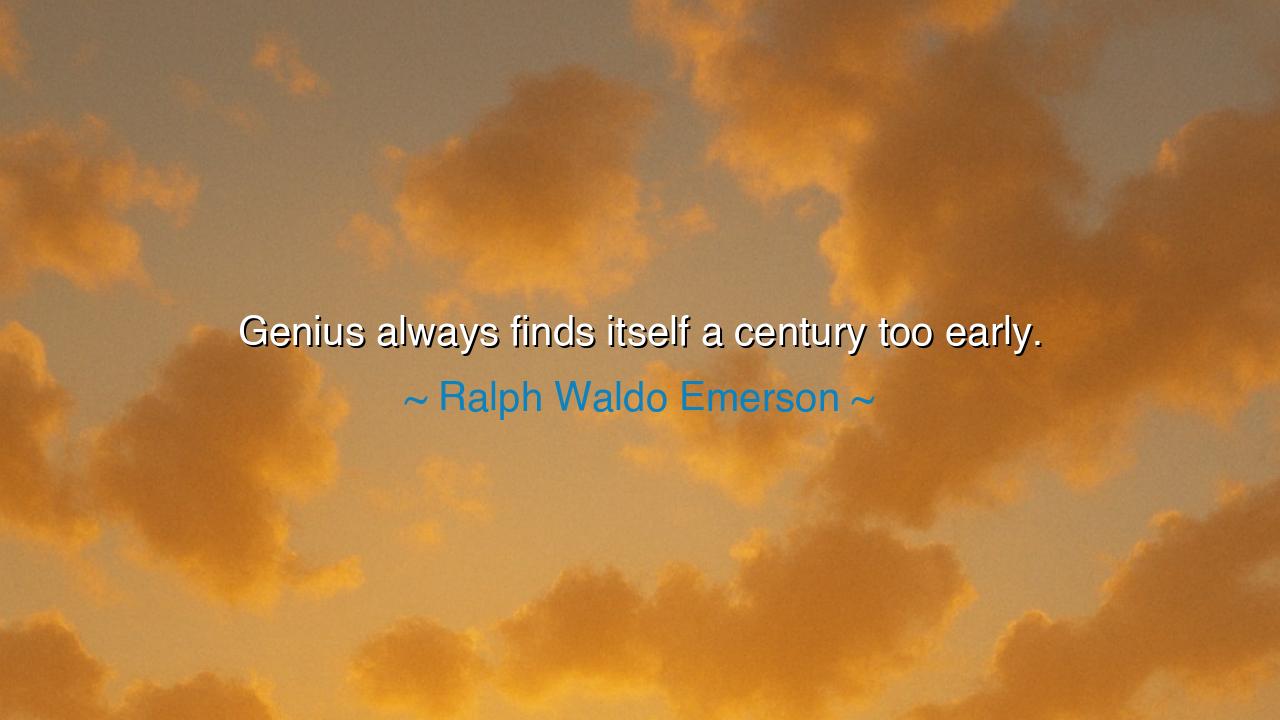
Genius always finds itself a century too early.






The words of Ralph Waldo Emerson — “Genius always finds itself a century too early.” — carry the quiet thunder of prophecy. They speak to the loneliness of visionaries, to the burden of those who see farther than their time allows. Emerson, philosopher of the soul and prophet of individual greatness, understood that true genius is not the art of pleasing one’s age, but the courage to speak to the ages yet to come. To be ahead of one’s time is both a blessing and a sorrow — a fire that burns brightly in the night while the rest of the world still sleeps.
To say that genius finds itself a century too early is to acknowledge the eternal pattern of history: those who dream beyond their era are rarely understood by it. The visionary walks the path before the road is paved; he sees the sunrise while others still dwell in darkness. The poet, the inventor, the thinker — each stands like a solitary bridge between what is and what could be. The world, slow to change, mocks what it does not yet comprehend. Thus, genius lives in exile, not by choice, but by destiny. Its words and works are seeds scattered upon the hard soil of ignorance, to bloom only when future generations are ready to receive them.
The origin of Emerson’s thought lies in his transcendental belief that human greatness comes from the divine spark within — that every soul carries a fragment of the eternal mind. Yet, he also knew that society often fears those who express this inner light too freely. Emerson’s own life bore witness to this truth. His essays on self-reliance, nature, and individualism were radical in their time, defying conformity, tradition, and blind obedience. He urged people to trust their own hearts more than institutions or creeds. Many admired him; others dismissed him as heretical or impractical. Yet today, his ideas form the foundation of modern thought on freedom, creativity, and moral independence. Emerson, like so many before him, spoke in a language his age could not yet fully hear.
History is filled with examples that breathe life into Emerson’s words. Consider Galileo Galilei, who dared to proclaim that the earth revolved around the sun — a truth so profound, yet so intolerable to his century, that he was condemned as a heretic. He saw reality through the telescope of the future, while the world clung to the myths of the past. Or think of Vincent van Gogh, whose art burst with color and emotion beyond the understanding of his time. He sold not one painting in his life, and died believing himself a failure. Yet his vision reshaped art for all generations that followed. Genius, as Emerson says, walks alone for a season, but history — slow and patient — always turns to meet it.
There is a tragic beauty in this delay. For when genius arrives too early, it plants ideas that the world must grow into. Like a star whose light takes centuries to reach the earth, the brilliance of a visionary is often seen only after they are gone. Their work endures not because it was understood, but because it was true. Time itself becomes their ally, polishing what was once rejected, revealing its worth to those who have learned to see. Thus, the pain of being early becomes, in the end, the honor of being eternal.
But Emerson’s words are not a lament — they are a call to courage. He reminds every soul that to follow one’s inner light is to risk being misunderstood. The road of originality is steep and solitary, but it leads toward immortality. The one who conforms to the comfort of the present may be praised today, but forgotten tomorrow. The one who dares to bring forth the truth of their vision, though scorned in their lifetime, leaves a legacy that outlives the centuries. To create, one must accept the pain of isolation; to lead, one must walk ahead of the crowd and bear the silence of distance.
So, O seeker of wisdom, take this lesson from Ralph Waldo Emerson: do not fear being too early. Every era mocks its prophets until it builds monuments to them. Walk your path with faith, even if no one walks beside you. If your thoughts are too vast for your time, hold them still — for time itself will one day catch up. The genius of today becomes the heritage of tomorrow. Therefore, think bravely, speak truly, and live authentically. For the measure of a life is not how well it fits the present, but how deeply it shapes the future.






AAdministratorAdministrator
Welcome, honored guests. Please leave a comment, we will respond soon